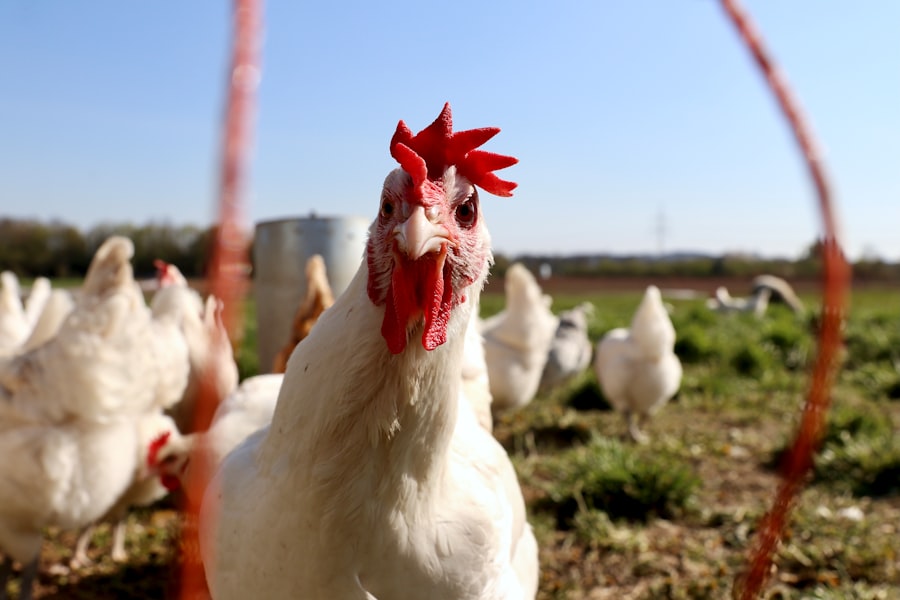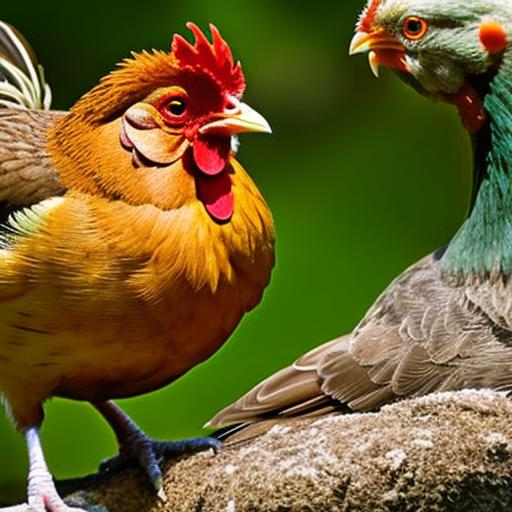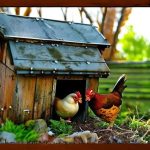Keeping chickens as a hobby has become increasingly popular in recent years. More and more people are discovering the joys of having their own flock of chickens in their backyard. There are several reasons why keeping chickens can be a rewarding and fulfilling experience.
One of the main benefits of keeping chickens is the fresh eggs they provide. There is nothing quite like collecting eggs from your own chickens and enjoying them for breakfast. Not only are fresh eggs delicious, but they are also healthier than store-bought eggs. Chickens that are allowed to roam freely and eat a natural diet produce eggs that are higher in omega-3 fatty acids and vitamins.
Another benefit of keeping chickens is that they can help with natural pest control. Chickens love to eat insects, slugs, and other pests that can damage your garden. By allowing your chickens to free-range in your yard, you can reduce the need for chemical pesticides and keep your garden healthy and pest-free.
In addition to fresh eggs and natural pest control, keeping chickens also provides you with a source of organic fertilizer for your garden. Chicken manure is rich in nutrients and can be used to improve the soil quality in your garden. By composting chicken manure and using it as fertilizer, you can reduce the need for synthetic fertilizers and create a more sustainable garden.
Key Takeaways
- Keeping chickens can provide a variety of benefits, including fresh eggs, pest control, and fertilizer for your garden.
- Choosing the right chicken coop is important for the health and safety of your flock.
- The size and design of your chicken coop should be based on the number of chickens you have and the climate in your area.
- The location and placement of your chicken coop should provide protection from predators and access to sunlight and fresh air.
- Regular maintenance, proper feeding, and attention to health and safety can help ensure a successful and enjoyable experience keeping chickens.
Benefits of Keeping Chickens
Keeping chickens has numerous benefits that go beyond just fresh eggs, natural pest control, and fertilizer for the garden. One of the most rewarding aspects of keeping chickens is the connection with nature that it provides. Watching chickens scratch around in the yard, dust bathing, and interacting with each other can be incredibly therapeutic and calming.
Chickens also have unique personalities and can be quite entertaining to watch. They have their own social hierarchy within the flock and each chicken has its own quirks and behaviors. Some chickens may be more curious and adventurous, while others may be more shy and reserved. Getting to know each chicken’s personality can be a fun and rewarding experience.
Another benefit of keeping chickens is the educational opportunities it provides, especially for children. By caring for chickens, children can learn about responsibility, empathy, and the circle of life. They can also learn about where their food comes from and the importance of sustainable and ethical farming practices.
The Right Chicken Coop for Your Flock
Having a chicken coop is essential for keeping chickens. It provides them with a safe and secure place to roost, lay eggs, and seek shelter from the elements. There are several different types of chicken coops available, each with its own pros and cons.
One option is a traditional wooden coop. Wooden coops are sturdy and provide good insulation, but they require regular maintenance to prevent rotting and damage from pests. Another option is a plastic or metal coop, which is easier to clean and maintain but may not provide as much insulation.
When choosing a chicken coop, there are several factors to consider. The size of the coop should be appropriate for the number of chickens in your flock. Each chicken should have at least 4 square feet of space inside the coop and 10 square feet of space in the outdoor run. The materials used to build the coop should be durable and predator-proof. The cost of the coop should also be taken into consideration, as well as any local regulations or restrictions on keeping chickens.
Chicken Coop Size and Design
The size and design of your chicken coop will depend on the number of chickens in your flock. It is important to provide enough space for each chicken to move around comfortably and engage in natural behaviors such as scratching, perching, and nesting.
A general rule of thumb is to allow at least 4 square feet of space inside the coop per chicken. This means that if you have 6 chickens, your coop should be at least 24 square feet. In addition to the indoor space, chickens also need access to an outdoor run where they can stretch their legs and get fresh air.
When designing your chicken coop, there are several important features to consider. Ventilation is crucial to prevent the buildup of moisture and ammonia from chicken droppings. Windows or vents should be installed to allow for proper airflow. Lighting is also important to provide a natural day-night cycle for your chickens. Nesting boxes should be included in the coop for chickens to lay their eggs. Each nesting box should be about 12 inches square and filled with clean bedding.
If you are handy and enjoy DIY projects, you may consider building your own chicken coop. There are many resources available online that provide step-by-step instructions and plans for building a chicken coop. Building your own coop allows you to customize it to your specific needs and preferences.
Chicken Coop Location and Placement
Choosing the right location for your chicken coop is crucial for the health and safety of your chickens. The location should provide a balance of sunlight and shade throughout the day. Chickens need access to sunlight for vitamin D production, but they also need shade to protect them from extreme heat.
The proximity of the coop to your home is also an important factor to consider. You will want the coop to be easily accessible so that you can check on your chickens, collect eggs, and perform regular maintenance tasks. However, it should not be too close to your home as chickens can be noisy and produce odors.
When choosing a location for your chicken coop, it is important to consider the safety and security of your chickens. The coop should be protected from predators such as raccoons, foxes, and dogs. It should have a secure fence or wire mesh around the perimeter to prevent predators from gaining access. The coop should also have a secure door that can be locked at night to keep your chickens safe.
Chicken Coop Maintenance

Regular maintenance is essential for keeping your chicken coop clean and healthy. There are several tasks that should be done on a daily, weekly, and monthly basis to ensure the well-being of your chickens.
On a daily basis, you should check the coop for any signs of damage or wear and tear. You should also check the feed and water containers to make sure they are clean and filled. Any droppings or soiled bedding should be removed from the coop to prevent the buildup of ammonia and odors.
On a weekly basis, you should clean the coop thoroughly. This includes removing all bedding, sweeping or hosing down the floor, and disinfecting the surfaces with a poultry-safe cleaner. The nesting boxes should also be cleaned and fresh bedding should be added.
On a monthly basis, you should inspect the coop for any signs of pests such as mites or lice. If you notice any pests, you should take immediate action to treat the infestation. You should also inspect the coop for any signs of damage or wear and tear that may need to be repaired.
Feeding Your Chickens
Providing a balanced diet is essential for keeping your chickens healthy and productive. Chickens require a diet that is high in protein, vitamins, and minerals to support their growth, egg production, and overall health.
There are several different types of chicken feed available on the market. The most common type is commercial pellet feed, which is formulated to provide all the necessary nutrients for chickens. Pellet feed is convenient and easy to store, but it may not be as natural or nutritious as other types of feed.
Another option is to feed your chickens a combination of commercial feed and kitchen scraps. Chickens can eat a wide variety of fruits, vegetables, grains, and protein sources. Feeding them kitchen scraps not only reduces waste but also provides them with a more varied and natural diet.
When feeding your chickens, it is important to provide them with the right amount of food. Overfeeding can lead to obesity and health problems, while underfeeding can result in malnutrition and reduced egg production. A general guideline is to provide about 1/4 to 1/3 pound of feed per chicken per day.
Health and Safety for Your Chickens
Keeping your chickens healthy and safe is essential for their well-being and productivity. There are several common health issues that can affect chickens, such as respiratory infections, parasites, and nutritional deficiencies.
To prevent respiratory infections, it is important to provide good ventilation in the coop and keep the coop clean and dry. Regular cleaning and disinfection can help prevent the buildup of bacteria and viruses that can cause respiratory infections.
Parasites such as mites and lice can also be a problem for chickens. Regular inspection of the coop and chickens can help detect any signs of infestation. If you notice any pests, you should take immediate action to treat the infestation with poultry-safe products.
Nutritional deficiencies can occur if chickens are not provided with a balanced diet. It is important to feed them a variety of foods that provide all the necessary nutrients. If you notice any signs of nutritional deficiencies, such as poor feather quality or reduced egg production, you may need to adjust their diet or provide supplements.
In addition to health issues, it is also important to keep your chickens safe from predators and other hazards. The coop should be secure and protected from predators such as raccoons, foxes, and dogs. The outdoor run should also be covered with wire mesh to prevent birds of prey from attacking your chickens.
Egg Production and Collection
Understanding the process of egg production in chickens can help you maximize their productivity. Chickens typically start laying eggs at around 5-6 months of age and continue laying for several years. However, egg production can be affected by several factors, such as age, diet, and environmental conditions.
As chickens age, their egg production may decrease. This is a natural process and cannot be prevented. However, providing them with a balanced diet and a comfortable environment can help maintain their egg production for longer.
The diet of your chickens can also affect their egg production. Chickens require a diet that is high in protein, vitamins, and minerals to support egg production. Providing them with a balanced diet that includes commercial feed and kitchen scraps can help ensure they have all the necessary nutrients.
Collecting eggs from your chickens should be done on a daily basis to prevent them from becoming dirty or damaged. Eggs should be collected gently and placed in a clean container. It is important to handle eggs with care to prevent cracking or breaking.
To store eggs safely and efficiently, they should be kept in a cool and dry place. They should not be washed until just before use, as washing can remove the protective coating on the shell. If you have an abundance of eggs, you may consider preserving them by freezing or pickling.
The Joys of Keeping Chickens
Keeping chickens can be a fun and rewarding hobby that provides numerous benefits. From fresh eggs to natural pest control and fertilizer for the garden, chickens offer a range of advantages for backyard enthusiasts.
Caring for chickens requires some time and effort, but the rewards are well worth it. The connection with nature, the educational opportunities, and the entertainment provided by these unique creatures make keeping chickens a truly fulfilling experience.
If you are considering keeping chickens, take the time to research and plan before getting started. Choose the right chicken coop for your flock, provide them with a balanced diet, and ensure their health and safety. With proper care and maintenance, your chickens will thrive and provide you with years of joy and satisfaction.
If you’re considering keeping chickens, you’ll want to make sure you have a suitable coop for them. A large chicken coop is essential for providing enough space and comfort for your feathered friends. Poultry Wizard offers some great ideas for large chicken coop designs that can accommodate multiple chickens and provide them with a safe and secure environment. Check out their article on “Large Chicken Coop Ideas” to get inspired and create the perfect home for your flock. Additionally, if you’re wondering how many chickens you need for a family of four, Poultry Wizard has got you covered with their informative article on “How Many Chickens Do You Need for a Family of 4?” They provide insights into the ideal number of chickens to meet your family’s egg needs.
FAQs
What are the benefits of keeping chickens?
Keeping chickens can provide a source of fresh eggs, natural pest control for your garden, and fertilizer for your plants.
How much space do chickens need?
Chickens need at least 4 square feet of coop space per bird and 10 square feet of outdoor space per bird.
What do chickens eat?
Chickens eat a variety of foods including grains, vegetables, fruits, and insects.
How often do chickens lay eggs?
Most chickens lay eggs daily or every other day, but this can vary depending on the breed and age of the chicken.
What is the lifespan of a chicken?
The lifespan of a chicken can vary depending on the breed, but on average they can live up to 8 years.
What are some common health issues for chickens?
Common health issues for chickens include mites, lice, respiratory infections, and egg-laying problems.
Do chickens need a rooster to lay eggs?
No, chickens do not need a rooster to lay eggs. Hens will lay eggs regardless of whether or not there is a rooster present.
What is the best way to keep chickens safe from predators?
The best way to keep chickens safe from predators is to provide a secure coop and run, use fencing and netting, and lock up the coop at night.
What is the best way to clean a chicken coop?
The best way to clean a chicken coop is to remove all bedding and debris, scrub the surfaces with a mild detergent, and rinse thoroughly with water.
What are some common breeds of chickens?
Common breeds of chickens include Rhode Island Reds, Leghorns, Plymouth Rocks, and Orpingtons.
Meet Walter, the feathered-friend fanatic of Florida! Nestled in the sunshine state, Walter struts through life with his feathered companions, clucking his way to happiness. With a coop that’s fancier than a five-star hotel, he’s the Don Juan of the chicken world. When he’s not teaching his hens to do the cha-cha, you’ll find him in a heated debate with his prized rooster, Sir Clucks-a-Lot. Walter’s poultry passion is no yolk; he’s the sunny-side-up guy you never knew you needed in your flock of friends!







